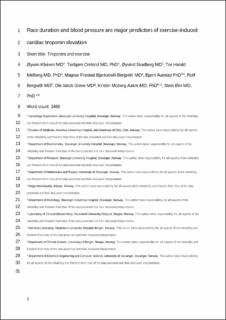Race duration and blood pressure are major predictors of exercise-induced cardiac troponin elevation
Kleiven, Øyunn; Omland, Torbjørn; Skadberg, Øyvind; Melberg, Tor Harald; Bjørkavoll-Bergseth, Magnus; Auestad, Bjørn Henrik; Bergseth, Rolf; Greve, Ole Jacob; Aakre, Kristin Moberg; Ørn, Stein
Journal article, Peer reviewed
Accepted version
Permanent lenke
http://hdl.handle.net/11250/2647325Utgivelsesdato
2019-02Metadata
Vis full innførselSamlinger
Originalversjon
Kleiven, Ø., Omland, T., Skadberg, Ø. et al. (2019) Race duration and blood pressure are major predictors of exercise-induced cardiac troponin elevation. International Journal of Cardiology, 283, pp. 1-8. 10.1016/j.ijcard.2019.02.044Sammendrag
Background
The underlying mechanisms of the exercise-induced increase in cardiac troponins (cTn) are poorly understood. The aim of this study was to identify independent determinants of exercise-induced cTn increase in a large cohort of healthy recreational athletes.
Methods
A total of 1002 recreational cyclists without known cardiovascular disease or medication, participating in a 91-km mountain bike race were included. Median age was 47 years and 78% were males. Blood samples were obtained 24 h prior to, and 3 and 24 h after the race.
Results
Cardiac TnI concentrations increased markedly from baseline [1.9 (1.6–3.0) ng/L] to 3 h after the race [52.1 (32.4–91.8) ng/L], declining at 24 h after the race [9.9 (6.0–20.0) ng/L]. Similarly, cTnT increased from baseline [3.0 (3.0–4.2) ng/L] to 3 h after the race [35.6 (24.4–54.4) ng/L], followed by a decline at 24 h after the race [10.0 (6.9–15.6) ng/L]. The 99th percentile was exceeded at 3 h after the race in 84% (n = 842) of subjects using the cTnI assay and in 92% (n = 925) of study subjects using the cTnT assay. Shorter race duration and higher systolic blood pressure (SBP) at baseline were highly significant (p < 0.001) independent predictors of exercise-induced cTn increase both in bivariate and multivariable analysis. The age, gender, body mass index, training experience and cardiovascular risk of participants were found to be less consistent predictors.
Conclusion
Systolic blood pressure and race duration were consistent predictors of the exercise-induced cTn increase. These variables likely reflect important mechanisms involved in the exercise-induced cTn elevation.

